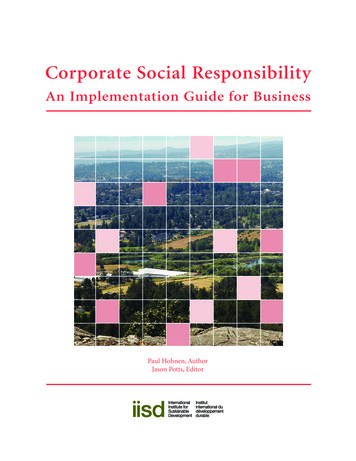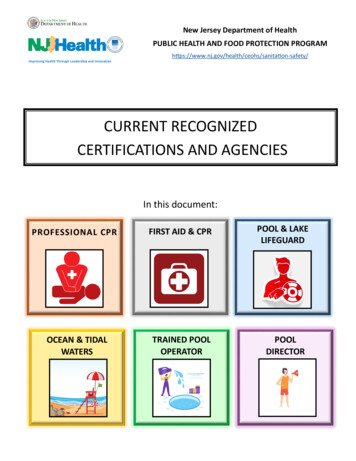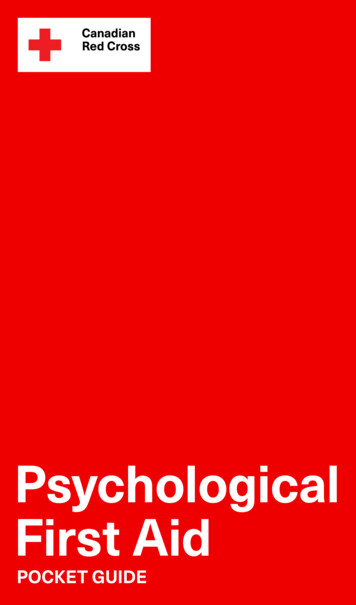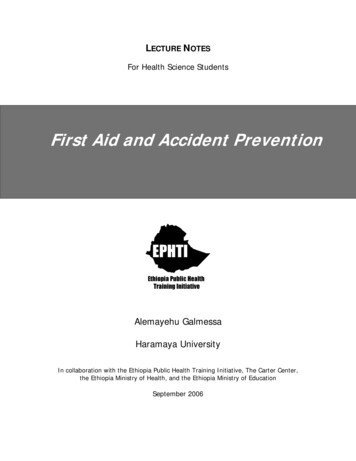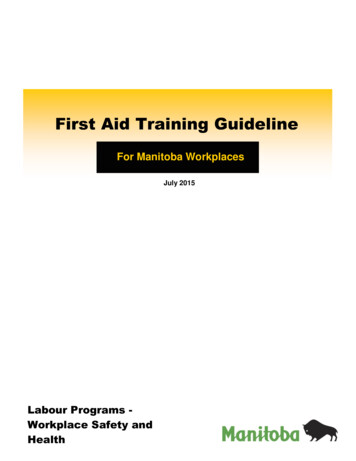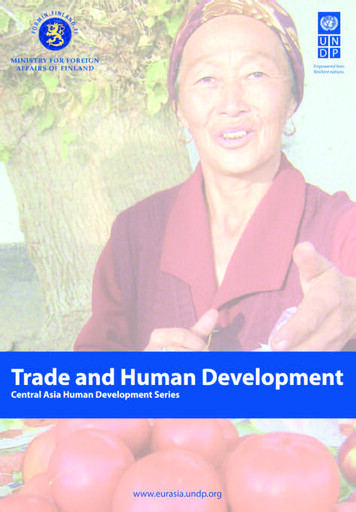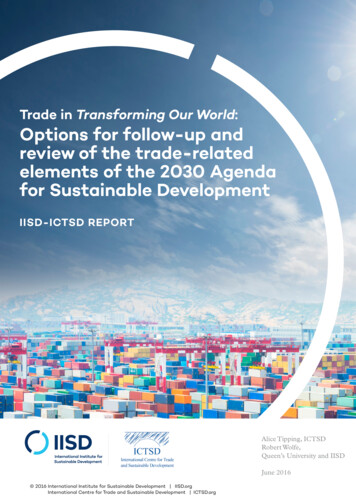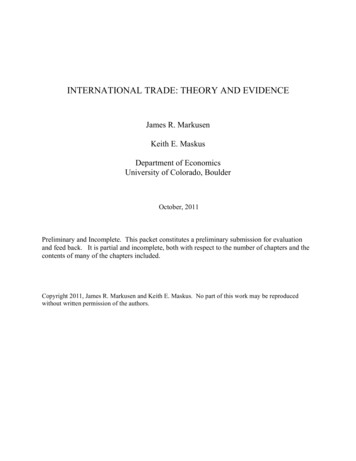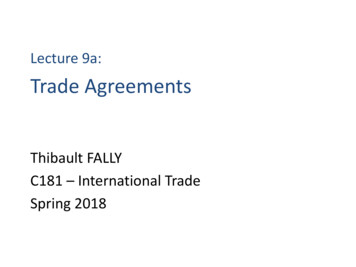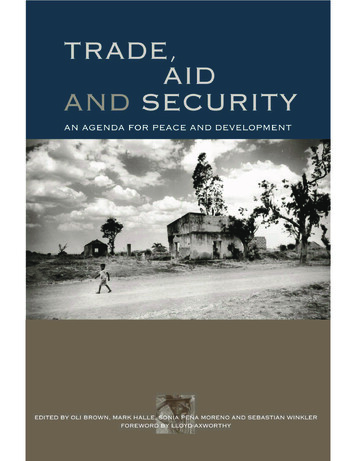
Transcription
Trade, Aid and Security
Trade, Aid and SecurityAn Agenda for Peace and DevelopmentEdited byOli Brown, Mark Halle, Sonia Peña Morenoand Sebastian WinklerEAR T H SCANLondon Sterling, VA
First published by Earthscan in the UK and USA in 2007Copyright IISD and IUCN, 2007All rights reservedISBN-13: 978-1-84407-419-8 (paperback)ISBN-13: 978-1-84407-420-4 (hardback)Typeset by JS Typesetting Ltd, Porthcawl, Mid GlamorganPrinted and bound in the UK by Cromwell Press, TrowbridgeCover design by Susanne HarrisFront cover image ‘After the War, Angola 2002’ by Amelia BooksteinBack cover image ‘Carrying Water, Thyolo, Malawi 2002’ by Amelia BooksteinFor a full list of publications please contact:Earthscan8–12 Camden High StreetLondon, NW1 0JH, UKTel: 44 (0)20 7387 8558Fax: 44 (0)20 7387 8998Email: earthinfo@earthscan.co.ukWeb: www.earthscan.co.uk22883 Quicksilver Drive, Sterling, VA 20166-2012, USAEarthscan is an imprint of James and James (Science Publishers) Ltd and publishes inassociation with the International Institute for Environment and DevelopmentA catalogue record for this book is available from the British LibraryLibrary of Congress Cataloging-in-Publication DataTrade, aid, and security : an agenda for peace and development / edited byOli Brown . . . [et al.].p. cm.ISBN-13: 978-1-84407-420-4 (hardback)ISBN-10: 1-84407-420-X (hardback)ISBN-13: 978-1-84407-419-8 (pbk.)ISBN-10: 1-84407-419-6 (pbk.)1. Peace–Economic aspects. 2. Economic development–Internationalcooperation. 3. International trade–Political aspects. 4. Economicassistance–International cooperation. 5. Security, International–Economicaspects. I. Brown, Oli.JZ5538.T73 2007338.9–dc222006100474This publication is printed on FSC certified totally chlorine-free paper.FSC (the Forest Stewardship Council) is an international network topromote responsible management of the world’s forests.
ContentsList of Tables and BoxesThe World Conservation Union and the International Institute forSustainable DevelopmentList of ContributorsAcknowledgementsForewordList of Acronyms and AbbreviationsIntroduction: Trade, Aid and Security: An Agenda for Peaceand DevelopmentDuncan Brackviiviiixxiixiiixvii11Designing Conflict-sensitive Trade PolicyMark Curtis2Developing Conflict-sensitive Aid: The Relationshipbetween Aid and ConflictIan Smillie41Promoting ‘Good’ Governance through Trade and Aid:Instruments of Coercion or Vehicles of Communication?Oli Brown7234Building Markets for Conflict-free GoodsDuncan Brack and Gavin Hayman5Promoting Conflict-sensitive Business in Fragile States:Redressing Skewed IncentivesKaren Ballentine6Managing Revenues from Natural Resources and AidRichard Auty and Philippe Le Billon1892126158
vi Trade, Aid and Security: An Agenda for Peace and DevelopmentConclusion: Prospects for Peace and ProgressMark Halle190Index198
List of Tables and BoxesTables4.14.26.16.2Dynamics affecting three natural resources and their relationshipto conflictUN sanctions on conflict commoditiesStructure of GDP and employment in Algeria, 1999PWYP and EITI compared104105165180Boxes6.16.2The UN Oil-for-Food programme in IraqRevenue management laws in conflict-affected countries167171
The World Conservation Unionand the International Institute forSustainable DevelopmentThe World Conservation UnionFounded in 1948, The World Conservation Union (IUCN) brings togetherstates, government agencies and a diverse range of non-governmental organizations (NGOs) in a unique world partnership: over 1000 members in all,spread across some 140 countries.As a union, IUCN seeks to influence, encourage and assist societiesthroughout the world to conserve the integrity and diversity of nature andto ensure that any use of natural resources is equitable and ecologicallysustainable.IUCN builds on the strengths of its members, networks and partners toenhance their capacity and to support global alliances to safeguard naturalresources at local, regional and global levels.International Institute for Sustainable DevelopmentThe International Institute for Sustainable Development (IISD), based inWinnipeg, Canada, contributes to sustainable development by advancing policyrecommendations on international trade and investment, economic policy,climate change and energy, measurement and assessment, and sustainablenatural resources management. Through the internet, we report on international negotiations and share knowledge gained through collaborative projectswith global partners, resulting in more rigorous research, capacity building indeveloping countries and better dialogue between north and south.IISD’s vision is better living for all – sustainably; its mission is to championinnovation, enabling societies to live sustainably. IISD is registered as a charitableorganization in Canada and has 501(c)(3) status in the US. IISD receivescore operating support from the Government of Canada, provided throughthe Canadian International Development Agency (CIDA), the International
The IUCN and the IISDixDevelopment Research Centre (IDRC) and Environment Canada, andfrom the Province of Manitoba. The Institute receives project funding fromnumerous governments inside and outside Canada, United Nations’ agencies,foundations and the private sector. Visit www.iisd.org for more information.
List of ContributorsRichard Auty is Emeritus Professor of Economic Geography at LancasterUniversity. He previously taught at Dartmouth College and was a visitingfellow at the Institute of Development Studies (Sussex), Harvard Institutefor International Development, Resources for the Future and the WoodrowWilson School, Princeton.Lloyd Axworthy is President and Vice Chancellor of the University ofWinnipeg. Formerly Director and CEO of the Liu Institute for Global Issues atthe University of British Columbia, and Canada’s Foreign Minister from 1995to 2000, Lloyd Axworthy’s political career spanned 27 years, 6 of which heserved in the Manitoba Legislative Assembly and 21 in the Federal Parliament.In 1997 he was nominated for the Nobel Peace Prize for his work on banningland mines.Karen Ballentine is an independent consultant on the political economy ofarmed conflict. In 2004–05, she was Senior Consultant for the Fafo Institute forApplied International Studies. From 2000 to 2003, she directed the EconomicAgendas in Civil Wars Program at the International Peace Academy.Duncan Brack is an Associate Fellow of the Energy, Environment andDevelopment Programme at Chatham House (the Royal Institute ofInternational Affairs) in London in the UK, where he works mainly on illegaltrade in natural resources. From 1998 to 2003, he was Head of the Programme,and from 1995 to 1998 a Senior Research Fellow at Chatham House, workingon trade and environment issues.Oli Brown is the coordinator of IISD–IUCN’s Trade, Aid and Securityinitiative. After two years in Nepal managing education and conservationprojects, Oli worked as a trade policy researcher for Oxfam GB. He hascompleted consultancies for the United Nations Development Programme(UNDP), New Zealand’s International Aid and Development Agency(NZAID) and International Alert and has worked on a wide range of trade,environment and sustainable development issues.
List of ContributorsxiMark Curtis is currently an independent author, journalist and consultant.He is a former Research Fellow at Chatham House (the Royal Institute ofInternational Affairs) and was until recently Director of the World Development Movement.Mark Halle directs IISD’s global programme on trade and investment as wellas its European office in Geneva, Switzerland. He serves as a Senior Advisor toIUCN and runs the trade activities of the International Institute for Environmentand Development’s (IIED) Regional and International Networking Group. Heis founder and former Chairman of the Board of the International Centre forTrade and Sustainable Development.Gavin Hayman is an investigator and campaigner with Global Witness basedin London, UK. He has contributed substantially to Global Witness’ work onoil, gas and mining, and the linkages between natural resources and conflict.Philippe Le Billon is Assistant Professor at the University of BritishColumbia, Department of Geography and Liu Institute for Global Issues.Holding an MBA and DPhil in Geography, he previously worked with theOverseas Development Institute and the International Institute for StrategicStudies on humanitarian and resource management issues.Sonia Peña Moreno works at the Policy, Biodiversity and InternationalAgreements Unit of IUCN. Her work as Policy Officer is related to issues ofenvironmental governance, IUCN’s general policy and environmental policyat the multilateral level.Ian Smillie is an Ottawa-based development consultant and writer. He servesas Research Coordinator on Partnership Africa Canada’s ‘Diamonds andHuman Security Project’ and is an NGO participant in the intergovernmental‘Kimberley Process’, which is developing a global certification system forrough diamonds.Sebastian Winkler is Senior European Policy Officer and Head of theCountdown 2010 Secretariat at IUCN.
AcknowledgementsThis book is the culmination of a four-year research collaboration between theIISD and the IUCN. It could not have been completed without the help andsupport of many valued colleagues and friends.From the beginning, the direction and scope of our research has beenguided by a dedicated and talented advisory group who have given generouslyof their time and experience. Without their input this project would have beenmuch diminished. Chaired by the Honourable Lloyd Axworthy, the groupincluded Duncan Brack, Gavin Hayman, Mark Beaumont Taylor, Valerie deCampos Mello, Christian Friis Bach, Georg Frerks, Ian Smillie, Leiv Lundeand Syed Mansoob Murshed. We are greatly indebted to them all.We are also deeply grateful to our contributing authors, whose professionalism, insights and patience made the development of this book aninspiring and educational experience. In addition many reviewers helped topolish the chapters: among them Jessie Banfield, Don Hubert, Aaron Cosbeyand Adam Barbolet. Special thanks must also go to Jason Switzer for hiscentral role in developing these ideas and nurturing the project through itsearly years.We are indebted to Rob West and the excellent team at Earthscan for seeingthis volume through to completion, and to Stu Slayen and Deborah Murith forhelping to smooth the publication process. Meanwhile the management skillsof Clarita Martinet-Fay helped to keep this project on-track through the yearsand we owe a huge debt of thanks to Alec Crawford for his tireless editorialefforts to bring this volume together.Warm thanks to David Runnalls,William Glanville and Martha ChouchenaRojas, respectively President and vice-President of IISD, and Head of thePolicy, Biodiversity and International Agreements Unit at IUCN, for theirconsistent moral and intellectual support for this project. Last, but certainlynot least, we would like to acknowledge our donors, the Norwegian Agencyfor Development Cooperation (NORAD) and the Italian Ministry of ForeignAffairs (Directorate General for Development Cooperation – DGCS), whohave generously supported the Trade, Aid and Security initiative from itsinception.Oli BrownMark HalleSonia Peña MorenoSebastian Winkler
ForewordLloyd AxworthyCommon risks threaten the security of individuals, regardless of their nationality.Old notions of national security predicated on the defence of state bordersmake little sense when the threats posed by violence and conflict, internationalnetworks of terrorists and criminals, pandemics and natural disasters requirea new approach to protecting people.The idea of ‘human security’ emerged as the Cold War ended and theinadequacies of the nation state system to meet the demands of globalizationcame into focus. The watchword for the human security idea was the principleof ‘responsibility to protect’ (R2P). If a state legitimately protects its citizensthen it is in full right to exercise its sovereign power. If it fails to do so, or infact is the perpetrator of a serious attack on the rights of its citizens, then theinternational community must assume the function. Under R2P, there shall beno more Rwanda and Srebrenica, or indeed Darfur.This has an important bearing on development policy because peace andsecurity are essential preconditions for sustainable development. Progress isimpossible in the midst of conflict and insecurity; institutions cannot function,people cannot plan for the future and education and sanitation take a backseatto day-to-day survival. It is no coincidence that those countries that are thefurthest away from achieving the Millennium Development Goals (MDGs)are those that continue to suffer political and economic instability.As a Special United Nations (UN) Envoy for Ethiopia and Eritrea I saw justhow intimate is the connection. The failure of the two governments to engagein any effort to resolve their border dispute and the corollary failure of theinternational community to seriously address the issue had a major impact onthe well-being of the people in the two countries. A World Bank study concludedthat millions were inflicted with enduring poverty because of a ‘security’ issue.Yet governmental aid agencies, the UN Millennium Development GoalsSecretariat and a variety of multilateral agencies, while calling for more moneyto alleviate the poverty of the region, would not consider the security elementas a necessary condition needing resolution.
xiv Trade, Aid and Security: An Agenda for Peace and DevelopmentAt the UN’s World Summit in September 2005, world leaders accepted theidea of a responsibility to protect; a definition of sovereignty that is centred noton the prerogatives of the state but on its primary responsibility to protect itscitizens. It is a principle that needs to be incorporated as part of any aid andtrade strategy.This historic commitment came out of the work of the International Commission on Intervention and State Sovereignty, established by Canada in 2000at the request of the Secretary General. Their 2001 report stated: ‘Such aresponsibility implies an evaluation of the issue from the perspective of thevictim, not the intervener; if a state cannot provide protection or is the authorof the crime, then it forfeits its sovereign right and the international communitysteps in, not just to protect, but to prevent and rebuild.’As the latter part of this passage makes clear, the responsibility to preventand rebuild are crucial components of the responsibility to protect principle.Prevention will always be a less costly alternative to war.As Canadian foreign minister between 1996 and 2000 I saw that internationalresponses to crises were (and still are) overwhelmingly reactive – we wereconstantly trying to put out the fires. It became obvious to me that the ‘fires’are more common because the international system does not lend itself toconflict prevention.The idea of R2P has come a long way. But I’d suggest that we needto take the idea even further. Rather than focusing our attention solely onreactive responses to conflict, we must also consider how current policies cansystematically undermine peace and development.Trade and aid policies are two of the areas that most require our attention.The direction and priorities of trade and aid policies, largely decided by thedeveloped world, can have profound impacts on the economies and stabilityof the developing world – in both positive and negative ways.In theory at least, if trade and aid policies are carefully designed andimplemented, they should encourage peace and security. Trade can establishincentives for peace by building a sense of interdependence and community.Trade can also be a powerful driver of economic growth and stability, reducingpoverty and providing non-military means to resolve disputes. There’s sometruth in the old saying that countries (and regions) that trade tend not tofight.Likewise, aid can help tackle the underlying causes of conflict by reducinginequalities, tackling poverty, providing basic services and promotingsustainable livelihoods. Aid can also help to improve domestic governanceand help countries bounce back from economic shocks.However, it is increasingly clear that international trade does not automatically reinforce stability or security. Nor is aid, as currently constructed,successfully achieving its aim of poverty alleviation. The reality is that badlydesigned trade and aid policies are too often increasing the likelihood andlongevity of violent conflict.In practice, the rules that govern international trade are fundamentallyunfair, biased towards rich countries and their corporations. Current trade
Forewordxvpolicy in Organisation for Economic Co-operation and Development (OECD)countries denies vital market access to the developing world’s products,particularly their agricultural goods. Escalating tariffs, complex regulationsand perverse domestic subsidies in the developed world continue to inhibit theefforts of developing countries to diversify their economies.At the same time, developing countries are being pushed to adoptuncompromising market liberalization, which can reduce government revenuesand undermine employment, increasing the prospects for political instabilityand competition over scarce resources.In essence, the poorly designed and unfair trade policies of the developedworld are stunting economic growth in the developing world and leaving manycountries locked into notoriously volatile commodity markets. A reliance onthe export of natural resources tends to lead to weaker institutions, economicdependence and political instability. Coupled with poorly governed internationalmarkets for natural resources, faltering economic growth and unpredictablegovernment revenues, this has proven to be an explosive combination time andagain around the world.Likewise, aid has not always been an entirely positive force. Critics ofdevelopment assistance have long argued that aid can make a bad situationworse, that it can ignore signs of trouble, that in supporting bad governmentsit can help set the stage for conflict, and that in ignoring security considerationsit contributes to poverty.In essence, trade, aid and security are all mutually reliant; if aid policy isgoing to be effective at lifting people out of poverty it must be conducted ina secure environment free from the existence or threat of violent conflict. Aidshould also help countries and communities access the very real benefits of fairinternational trade. And countries will only be able to gain from internationaltrade if they have the capacity to negotiate even-handed trade agreements.We need to go beyond R2P. The international community also has, Iwould suggest, a solemn ‘responsibility to prevent’ the outbreak of conflict.The extent to which we are helping to promote stability and avoid armedconflict is crucially dependent on the structural conditions established by ourtrade and aid policies. If we’re serious about reducing armed conflict aroundthe world we must first – and at the very least – ensure that our trade and aidpolicies ‘do no harm’.Clearly, trade and aid policies are not the sole sources of violent conflict:identity, ideology and history are all important factors. The point is simplythat peace-building is not just about sending battalions of peacekeeping troopsin blue helmets. Peace-building and conflict prevention must also be abouttackling the underlying causes of conflict – fixing the system that is permittingthe fires.This book is about fixing that system. Written by leading experts, andbenefiting greatly from the guidance of a committed and talented advisorycommittee, it develops our understanding of the complex links between trade,aid and security. It focuses on what should be our end objectives: ensuring tradeand aid policies are conflict-sensitive, fostering responsible business conduct,
xvi Trade, Aid and Security: An Agenda for Peace and Developmentreducing the trade in ‘conflict resources’, promoting good governance andhelping countries to manage more effectively the revenues they receive fromnatural resources and aid. Most importantly, it suggests practical solutions thatthe international community and domestic policy makers can adopt to achievethese goals.We have an opportunity to carry forward the momentum generated by theR2P movement and reform the elements of trade and aid policy that underminepeace and stability around the world. Now that would be a tremendouscontribution to human security.Lloyd Axworthy is President of the University of Winnipeg and former foreignminister of Canada. He also chaired the advisory committee of the IISD–IUCNTrade, Aid and Security initiative.
List of Acronyms and AOFATFFDIFISFLEGTFLNFSCAfrica, Caribbean and PacificAfrican Growth and Opportunity AgreementAgreement on Subsidies and Countervailing Measuresartisanal and small-scale miningAlien Torts Claims ActBritish PetroleumConvention on the Conservation of Antarctic Marine LivingResourcesCentral Emergency Response FundCompensatory Finance FacilityCanadian International Development AgencyConvention on International Trade in Endangered Species ofWild Fauna and FloraCentral Point of Expertise on TimberCommunist Party of NepalCanadian Standards Associationcorporate social responsibilityDevelopment Assistance Committee (OECD)Department for International Development (UK)Democratic Republic of the CongoEverything But ArmsEuropean Commissionexport credit agencyEuropean Commission’s Humanitarian Aid OfficeExtractive Industries Transparency InitiativeEconomic Partnership AgreementEuropean UnionFood and Agricultural OrganizationFinancial Action Task Forceforeign direct investmentFront Islamique du Salut of AlgeriaForest Law Enforcement, Governance and TradeFront de Libération Nationale of AlgeriaForest Stewardship Council
xviii Trade, Aid and Security: An Agenda for Peace and SCRTARUFSDTSSMTNCGroup of eightGeneral Agreement on Tariffs and Tradegross domestic incomegross domestic productgross national incomegross national productGuide on Resource Revenue TransparencyGeneralized System of Preferencesheavily indebted poor countriesInstitute of Development Studies (UK)International Finance CorporationInternational Financial InstitutionInternational Institute for Environment and DevelopmentInternational Institute for Sustainable DevelopmentInternational Monetary FundInitial Public Offeringillegal, unregulated and unreported fishingWorld Conservation Union, formerly the International Unionfor the Conservation of NatureKimberley Process Certification SchemeLeast Developed CountryMillennium Challenge AccountMillennium Development GoalsMultilateral Environmental AgreementMovement of the Democratic Forces of CasamanceMultilateral Investment Guarantee AgencyMarine Stewardship CouncilNorth America Free Trade AgreementNorth Atlantic Treaty OrganizationNew Partnership for Africa’s Developmentnon-governmental organizationNew Zealand’s International Aid and Development AgencyOffice for the Coordination of Humanitarian Assistance (UN)overseas development aidOrganisation for Economic Co-operation and DevelopmentOrganization of the Petroleum Exporting CountriesPapua New Guineapoverty reduction strategy paperPublish What You Payresponsibility to protectReports on the Observance of Standards and Codesregional trade agreementRevolutionary United Front (Sierra Leone)special and differential treatmentspecial safeguard mechanismTransnational Corporation
List of Acronyms and IDVPWTOWWFUnited NationsUnited Nations Conference on Trade and DevelopmentUnited Nations Development ProgrammeUnited Nations Educational, Scientific and CulturalOrganizationUnited Nations High Commissioner for RefugeesUnião Nacional para a Independência Total de AngolaUnited Nations Research Institute for Social DevelopmentUnited States Agency for International DevelopmentVoluntary PrinciplesWorld Trade OrganizationWorld Wildlife Fundxix
IntroductionTrade, Aid and Security: An Agendafor Peace and DevelopmentDuncan BrackThe battle for peace has to be fought on two fronts. The first front is the securityfront, where victory spells freedom from fear. The second is the economic andsocial front, where victory means freedom from want. Only victory on bothfronts can assure the world of an enduring peace.These words, spoken by US Secretary of State Edwin Stettinius during thefounding conference of the UN, remain as true today as they did when heuttered them in 1945 (UNDP, 2005, p168). And yet more than 60 years later,victory has not been won on either front. Far too many of the world’s peopleslive in fear and in want – and, as Stettinius recognized, the one feeds on theother.Over the six decades that separate us from the foundation of the UN, thelandscape of global security has changed beyond all recognition. The ending ofWorld War II – still in progress during the conference – did not bring an end toconflict. Nationalist insurgencies fought colonial powers, usually with success,only to find that independence often released ethnic tensions and civil warswithin the new states. The armed truce established by the global superpowersensured that there was no return to global conflict, but proxy wars fought bytheir clients erupted throughout the developing world. The ending of the ColdWar may have brought some relief from the threat of nuclear confrontation, butit has now given way to the global war on terror, and a widespread perceptionthat the world is becoming not more but less safe.The ‘war on terror’, however, has not replaced more conventional wars;since 1990, more than 3 million people have died in armed conflicts, and many
2 Trade, Aid and Security: An Agenda for Peace and Developmentmore as a result of famine and disease associated with war (in contrast, perhaps20,000 have died as result of terrorist incidents since 1998). Compared to theCold War period, however, the nature of these wars has changed fundamentally:conflict is now much more strongly associated with poverty. From 1946 to 1989,low-income countries accounted for just over one third of all conflicts, butduring the period 1990–2003, low-income developing countries constitutedmore than half of all the countries and territories experiencing violent conflict.Nearly 40 per cent of the world’s recent conflicts, including several of thebloodiest and longest, have been in Africa. And even though the number ofconflicts has fallen since 1990, today’s wars last longer, and their impact ondevelopment is accordingly more severe (UNDP, 2005, pp151–154).Despite this changing pattern of security and conflict, the internationalinstitutions erected in the aftermath of World War II, in response to the threatsposed by conflicts between states, have remained largely unchanged in theirarchitecture and outlook. Yet nowadays most conflicts are not between butwithin states – poor states – and most victims are not soldiers but civilians. Itought to be even more difficult today than it was in Stettinius’ time to considerpeace and development – freedom from fear and freedom from want – asseparate and unconnected objectives, yet that is largely what today’s globaland national institutions still do. Aid policy and trade policy – the crucialtools to unlock development – are seldom looked at from the perspective ofpromoting security, and security is not generally seen as a precondition fordevelopment.The need to see these objectives – trade, aid and security – as interlockingcomponents of the overriding objectives of peace and development is thepoint of this book. Our chapter authors, all leading experts in their fields,demonstrate how current approaches to aid and trade, although they have hadsome successes, have all too often failed to eradicate poverty, insecurity andconflict – and even, in some cases, have actually made them worse. We focuson the poorest countries, and in particular on those most highly dependenton the extraction of natural resources, such as timber, oil or gems; often thesecountries are poor and conflict-ridden precisely because they are reliant onnatural resources. And the revenues that flow from the markets of the westand the newly industrializing countries, hungry for the natural resources poorcountries produce, often both stimulate wars and pay for them.This is a key moment for the exploration of these trade–aid–securitylinkages. After years of decline, aid spending has finally turned up again, eventhough much of the increase over the last two years has been devoted to onecountry, Iraq. The failure of the reconstruction effort in Iraq is a stark reminderof the way in which development both relies on peace and security and isan essential precondition for it. At the same time Liberia and, perhaps, theDemocratic Republic of the Congo (DRC), provide more positive examplesof the use of aid in post-conflict reconstruction.No country, however, has ever been lifted out of poverty throughdevelopment aid alone. Developing countries need the access to internationalmarkets and foreign investment that allows their economies to develop and
Introduction3diversify. So the dismantling of trade barriers to poor-country exports is acrucial part of the equation. Yet with the World Trade Organization (WTO)Doha Round of negotiations somewhere, in the words of Indian trade ministerKamal Nath, ‘between intensive care and the crematorium’, there seems littlehope of further progress on that front. In any case, some time ago it becameimpossible to present Doha as the ‘development round’ it was originallysupposed to be.This faltering progress on aid and trade takes place ag
This book is the culmination of a four-year research collaboration between the IISD and the IUCN. It could not have been completed without the help and support of many valued colleagues and friends. From the beginning, the direction and scope of our research has been guided by a dedicated and talented advisory group who have given generously
